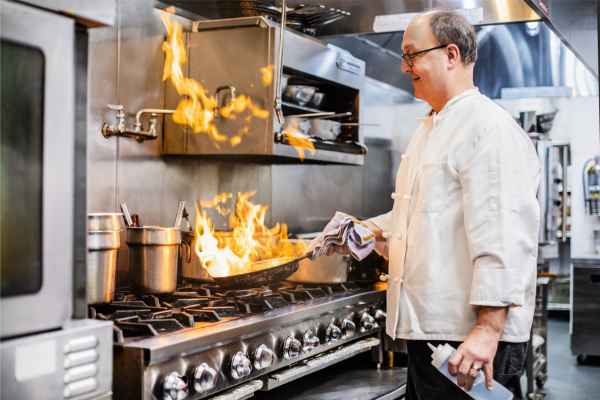
Over 9,000 culinary degrees were awarded in the United States in 2021. It’s one of the quickest pathways to becoming a chef.
But is it your only option? We have the information you need.
Read on to find out if culinary school is necessary to become a chef.
Culinary School Benefits
There are some benefits to culinary school you should consider when you’re beginning your culinary career.
Culinary schools offer structured programs that cover a wide range of culinary techniques, cuisines, and kitchen management skills. Students cover classic sauces, classic cooking techniques, pastry, and business classes as well. Many cooking schools have a restaurant attached, so expect to do a round in the restaurant as a server. Enlightening!
Most cooking schools use the French brigade model (have you seen “The Bear”?). This provides a strong foundation for your culinary career and those who have attended culinary school speak the same “language” as others who have attended.
They also expose students to a variety of international cuisines and are now hip to local, organic and seasonal menus. You’ll be able to expand both your culinary knowledge and skills in a relatively short period of time. Pastry chefs typically finish school in nine months, and full programs usually run sixteen months.
Speaking of pastry, if this is what you’re interested in, then you should definitely consider culinary school. Because of the highly technical nature of pasty, school is essential. You’ll learn laminated dough (think croissants), chocolate work, sugar work, cakes, tarts, etc., etc. Richard’s pastry chef, Taylor Houston, is a culinary school graduate and it shows in the precision of her work as well as the number of techniques she brings to each dessert she creates. Being a home baker isn’t enough to handle this demanding (and usually one-person) role.
Culinary school can help you figure out where you want to work after graduation. Many upscale restaurants or establishments prefer their chefs to have a formal culinary education, while more casual places usually don’t. If you want to work in a brewpub, then culinary school will be a waste of time and money.
Many culinary students work and attend school, so they can apply what they learn in the real world as they go. Schools can provide opportunities to network with industry professionals, even after graduation, and typically require internships at a restaurant. That can be invaluable for future job opportunities.
If you’re considering starting your own restaurant, food truck, catering or other food business, culinary school might not provide the business management skills you need. Consider supplementing your education with business courses beyond what is provided in school. If you have enough resources, you can always do both – just like Chef Langston did!
Culinary School Drawbacks
Culinary school isn’t always a mandatory qualification to become a professional chef. There are some factors that might rule it out for you.
Culinary school is expensive, and the cost of tuition, fees, and living expenses should be weighed against potential future earnings. Before you decide, look at different schools and see if attending is financially feasible in the first place. You’ll also need to think about culinary school requirements. You can’t get into good schools just by walking into the school from off the street. Most schools require a high school diploma or GED and references.
Most cooks come up through the ranks on the job, starting at the bottom (sometimes as a dishwasher), and working their way from prep cook to line cook, and then, with some talent, to sous chef and even head chef or kitchen manager. This is the way most cooks get into the business, but culinary school, according to Chef Langston, cuts about 6 years off this process. Something to consider, especially if you are coming into the profession later in life like he did and don’t want to start at the bottom.
Think about your learning style. If you’re not someone who does well in a classroom, culinary school might not be the best choice. While most classes in culinary school are hands-on, there are demos and lectures and reading. Not everyone is cut out for sitting in a classroom and doing homework.
Culinary school programs can take several months to over a year to complete. If you’re looking to enter the workforce quickly, this might not align with your goals.
Consider Culinary School Today
There are both pros and cons to culinary school, so you’ll have to decide what suits your needs. Do research into specific schools, talk to your loved ones, and think about it carefully. Eventually, you’ll be able to make the right decision for you.
Are you looking for an upscale restaurant in Boise? Check out Richard’s Restaurant & Bar today—their kitchen is a mix of both culinary graduates and folks who have worked their way up. You’d be hard pressed to tell which is which—they’re all talented and passionate about their craft!

